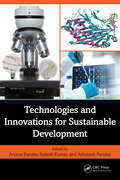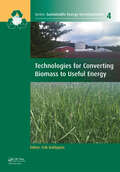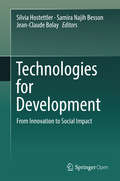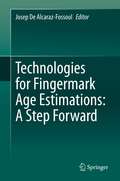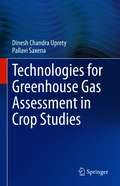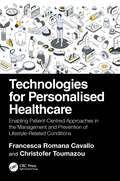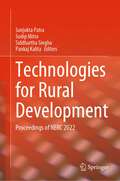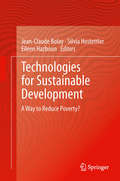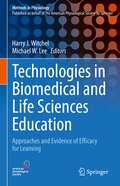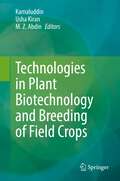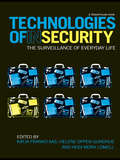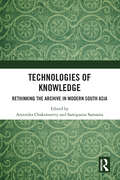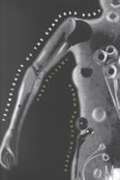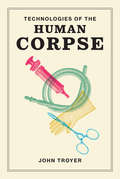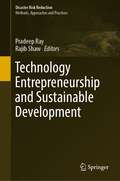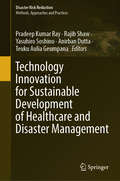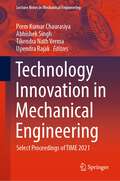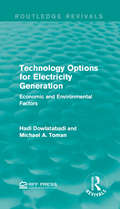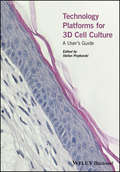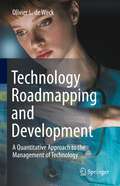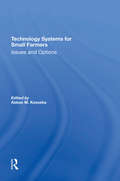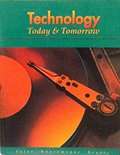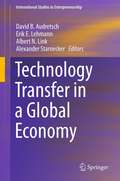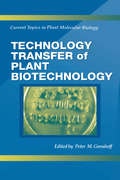- Table View
- List View
Technologies and Innovations for Sustainable Development
by Rakesh Kumar Ashutosh Pandey Anjana PandeyTechnologies and Innovations for Sustainable Development offers a comprehensive exploration of cutting-edge solutions that can help us build a greener, more equitable future. Too often, technologies are either not developed for a sufficiently profitable market, or if developed, are not accessible or well-adapted to end-user needs. This edited book seeks to advance knowledge and understanding of how to equitably improve the functioning of the “global innovation system” for sustainable development of technologies. This volume aims to examine specific cases of “system interventions” (e.g., policy interventions, institutional innovations, new approaches to shaping the innovation process, etc.) intended to strengthen the global innovation system, with the broader aim of developing policy recommendations and are generalizable across multiple sectors.This book brings together contributions from leading experts across diverse fields, showcasing the latest advancements in technology and innovative practices that address pressing sustainability issues. From hydrogen production and fuel blending to waste management and additive manufacturing process and application of emerging technologies such as machine learning, deep learning, and CFD simulation, this book provides a roadmap for harnessing innovation to achieve global sustainability goals.Key features include: An integrative overview of emerging and cutting-edge solutions to sustainable development Discussion on policy framework to address global environmental and public health challenges Forward-looking insights into emerging trends and future directions in sustainable development. Whether you are a policymaker, researcher, industry professional, or student, Technologies and Innovations for Sustainable Development is an essential resource for understanding the pivotal role of technology in creating a sustainable future. Join us in exploring the innovations that hold the key to a better world for generations to come.
Technologies for Converting Biomass to Useful Energy: Combustion, Gasification, Pyrolysis, Torrefaction and Fermentation (Sustainable Energy Developments)
by Erik DahlquistOfficially, the use of biomass for energy meets only 10-13% of the total global energy demand of 140 000 TWh per year. Still, thirty years ago the official figure was zero, as only traded biomass was included. While the actual production of biomass is in the range of 270 000 TWh per year, most of this is not used for energy purposes, and mostly it
Technologies for Development: From Innovation to Social Impact
by Jean-Claude Bolay Silvia Hostettler Samira Najih BessonThis open access book presents 18 case studies that explore current scientific and technological efforts to address global development issues, such as poverty, from a holistic and interdisciplinary point of view, putting actual impacts at the centre of its analysis. It illustrates the use of technologies for development in various fields of research, such as humanitarian action, medical and information and communication technology, disaster risk-reduction technologies, habitat and sustainable access to energy. The authors discuss how innovative technologies, such as unmanned aerial vehicles for disaster risk reduction, crowdsourcing humanitarian data, online education and ICT-based medical technologies can have significant social impact. The book brings together the best papers of the 2016 International Conference on Technologies for Development at EPFL, Switzerland. The book explores how the gap between innovation in the global South and actual social impact can be bridged. It fosters exchange between engineers, other scientists, practitioners and policy makers active at the interface of innovation and technology and human, social, and economic development.
Technologies for Fingermark Age Estimations: A Step Forward
by Josep De Alcaraz-FossoulThis book discusses new applications of technologies that have been or could be successfully employed to estimate the age of fingermarks. Determining the specific time a fingermark is deposited could become a powerful new development in forensic science and a useful application to law enforcement. This book aims to shed some light on this important and still controversial area of scientific research. The expert chapters review recent discoveries and current developments with a practical bent, focusing on prospective uses in real-world crime scenes. They take a multidisciplinary approach, featuring contributors with diverse specialties including Chemistry, Imaging Technologies, Forensic Science, Biology and Microbiology. The balanced presentation incorporates critiques on fingermark aging studies, explores the reliability of fingermarks as evidence, and discusses how the estimation of “age” can improve robustness of crime evidence. Each chapter describes a unique aspect of fingermark aging observed from a different analytical perspective: 2D imaging; 3D imaging; chemical analysis; chemical imaging; microbiome analysis; electrochemical analysis; and DNA analysis, as well as the role and application of statistics. Illustrations and graphs aid the reader in understanding the concepts being explained. Not just a compilation of techniques and methods, this book’s emphasis on practical applications and its easy-to-read style will appeal to a broad audience of scientists and criminal justice professionals alike. It will be of great interest to law enforcement, academia, and the criminal justice community; including forensic scientists, investigators, lawyers, students, and researchers. It aims to help facilitate debates in the broader community about the feasibility, convenience, and relevance of estimating the age of evidence.
Technologies for Green House Gas Assessment in Crop Studies
by Pallavi Saxena Dinesh Chandra UpretyGlobal climate change is one of the most serious threats to the environment of the earth and to the crop production. Crop’s vulnerability to climate change stress caused by the greenhouse gases emission is a serious concern. This book describes various technologies and methods including the simulation of the future climate changes, studying the response of crop plants and characterizing their responses physiologically and biochemically. It includes the latest information of protocols and technologies for climate change research on agriculture. This book is of interest to teachers, researchers, climate change scientists, capacity builders and policymakers. Also the book serves as additional reading material for undergraduate and graduate students of agriculture, forestry, ecology, soil science, and environmental sciences. National and international agricultural scientists, policy makers will also find this to be a useful read.
Technologies for Personalised Healthcare: Enabling Patient-Centred Approaches in the Management and Prevention of Lifestyle-Related Conditions
by Francesca Romana Cavallo Christofer ToumazouThis book explores how personalised healthcare can be realised with the integration of new and established technologies, and how novel methods can be developed to improve health outcomes in lifestyle-related conditions. Technologies for Personalised Healthcare: Enabling Patient-Centred Approaches in the Management and Prevention of Lifestyle-Related Conditions explores various aspects of personalised healthcare in the context of lifestyle-related conditions— from how statistics and machine learning can be used to extrapolate clinically useful stratifications from big data, to how adaptive AI can enable behaviour change; from how biosensors and point-of-care devices can bring diagnostics closer to the patient, to the ethical aspects of personalised medicine. The highly multidisciplinary nature of the book gives the reader a broad view of established and emerging technologies for personalised healthcare. It provides the technical background underpinning these technologies, while case studies present practical applications of the methods discussed. The content and worked examples found within this book can serve as a reference guide on the technologies and methods needed to tap into the endless opportunities to be realised within personalised healthcare. This book is intended for researchers and academics who want to know more about how they can apply computational methods and electronics within the field of personalised healthcare. It is also for those who are interested in the bridge between technology, engineering, and medicine.It is our hope that this book will serve as a catalyst for further innovation and collaboration in the pursuit of personalised healthcare solutions.
Technologies for Rural Development: Proceedings of NERC 2022
by Pankaj Kalita Sanjukta Patra Sudip Mitra Siddhartha SinghaThe book spans across the research domains of mechanisation and automation, agrobusiness, food processing and value addition, climate smart agriculture, rural sanitation, agro biotechnology, and rural energy.
Technologies for Sustainable Development: A Way to Reduce Poverty?
by Eileen Hazboun Jean-Claude Bolay Silvia HostettlerWhilst scientific research can be crucial in guiding innovation and development throughout the world, it can be too detached from real world applications, particularly in developing and emerging countries. Technologies for Sustainable Development brings together the best 20 papers from the 2012 Conference of the EPFL-UNESCO Chair in Technologies for Development with the aim to explore and discuss ways to link scientific research with development practices to assist practitioners and reply directly to social needs. In order for technologies to be adopted it is not sufficient that they are low cost and affordable but also socially, culturally and environmentally accepted by the intended users. Technologies for Sustainable Development aims to explore and answer the following three questions: * What is an appropriate technology? * How can we ensure a sustainable, integrated development? * What are the conditions for co-creation and transfer of such technologies? Focusing on the importance of improving working relationships between stakeholders; researchers and decision-makers; between scientists and industrial sectors; between academics and the population; Technologies for Sustainable Development opens a dialogue necessary to create and implement the best solutions adapted to social demands.
Technologies in Biomedical and Life Sciences Education: Approaches and Evidence of Efficacy for Learning (Methods in Physiology)
by Harry J. Witchel Michael W. LeeThis contributed volume focuses on understanding the educational strengths and weaknesses of mediated content (including media as a learning supplement), in comparison to traditional face-to-face learning. Each chapter includes research on, and a broad-brush summary of, approaches to combining life sciences education with educational technologies. The chapters are organized into four main sections, each of which focuses on a key question regarding the consequences of incorporating media into education. In this regard, the authors highlight how educational technology is both a bridge and barrier to student access and inclusivity. Further, they address the ongoing discussion as to whether students need to be present for lectures, and on how having agency in their own learning can improve both retention and conceptual understanding. To link the content to current events, the authors also shed light on the impact that the COVID-19 pandemic is having on the continuity of educational programs and on the growing importance of educational technologies. Consequently, the book offers life science educators valuable guidance on the technologies already available, and an outlook on what is yet to come.
Technologies in Plant Biotechnology and Breeding of Field Crops
by M. Z. Abdin Usha Kiran KamaluddinThis edited book is a comprehensive compilation of principles, conventional and molecular approaches used to develop improved varieties and hybrids of major crops in light of their origin, evolution, taxonomy, production and productivity and need by human civilization. The book covers breeding prospects of all important food and commercial crops. It highlights the importance of breeding tools and techniques in ensuring food security. This book is of interest to teachers, researchers, agriculture scientists, capacity builders, and policymakers. Also, the book serves as additional reading material for undergraduate and graduate students of agriculture, soil science, and environmental sciences. National and international agricultural scientists and policymakers will find this book useful.
Technologies of InSecurity: The Surveillance of Everyday Life
by Katja Aas Helene Gundhus Heidi LomellTechnologies of Insecurity examines how general social and political concerns about terrorism, crime, migration and globalization are translated into concrete practices of securitisation of everyday life. Who are we afraid of in a globalizing world? How are issues of safety and security constructed and addressed by various local actors and embodied in a variety of surveillance systems? Examining how various forms of contemporary insecurity are translated into, and reduced to, issues of surveillance and social control, this book explores a variety of practical and cultural aspects of technological control, as well as the discourses about safety and security surrounding them. (In)security is a politically and socially constructed phenomenon, with a variety of meanings and modalities. And, exploring the inherent duality and dialectics between our striving for security and the simultaneous production of insecurity, Technologies of Insecurity considers how mundane objects and activities are becoming bearers of risks which need to be neutralised. As ordinary arenas - such as the workplace, the city centre, the football stadium, the airport, and the internet - are imbued with various notions of risk and danger and subject to changing public attitudes and sensibilities, the critical deconstruction of the nexus between everyday surveillance and (in)security pursued here provides important new insights about how broader political issues are translated into concrete and local practices of social control and exclusion.
Technologies of Knowledge: Rethinking the Archive in Modern South Asia
by Samiparna Samanta Aryendra ChakravarttyThis book traces the role of technology in shaping, curating, disseminating, and archiving knowledge and life in South Asia. It focuses on empirical studies of transformative social processes unleashed by technological intervention in colonial and postcolonial contexts, which have changed our everyday lives and created new sites of domination and resistance, and new archives of history.Unraveling technology as an indicator of South Asia’s encounter with modernity, the chapters in the volume interrogate how technology was witnessed in the production of culture, historicizing and preserving the past, and establishing claims to heritage and history. In addition to examining the critical role of creative and commercial networks in establishing communities, the volume also scans the significant contribution of technology as a mechanism of social control. It highlights the pervasive nature of discourse that continues to assert its legitimacy, despite significant challenges to its structures of dominance, be it in the case of Bengali women or imperial dreams of curating a rapidly eroding past. In doing so, the volume emphasizes the discursive thoughts and practices that permeate the functioning of an empire and a postcolonial nation-state through narratives of resilience, appropriation, silences, and dissent.This volume will be of great interest to scholars and researchers of science and technology studies, digital humanities, South Asian studies, modern history, colonialism, and post-independence India.
Technologies of the Gendered Body: Reading Cyborg Women
by Anne BalsamoThis book takes the process of "reading the body" into the fields at the forefront of culture--the vast spaces mapped by science and technology--to show that the body in high-tech is as gendered as ever. From female body building to virtual reality, from cosmetic surgery to cyberpunk, from reproductive medicine to public health policies to TV science programs, Anne Balsamo articulates the key issues concerning the status of the body for feminist cultural studies in a postmodern world. Technologies of the Gendered Body combines close readings of popular texts--such as Margaret Atwood's novel The Handmaid's Tale, the movie Pumping Iron II: The Women, cyberpunk magazines, and mass media--with analyses of medical literature, public policy documents, and specific technological practices. Balsamo describes the ways in which certain biotechnologies are ideologically shaped by gender considerations and other beliefs about race, physical abilities, and economic and legal status. She presents a view of the conceptual system that structures individuals access to and participation in these technologies, as well as an overview of individuals rights and responsibilities in this sometimes baffling area. Examining the ways in which the body is gendered in its interactions with new technologies of corporeality, Technologies of the Gendered Body counters the claim that in our scientific culture the material body has become obsolete. With ample evidence that the techno-body is always gendered and marked by race, this book sets the stage for a renewed feminist engagement with contemporary technological narratives.
Technologies of the Human Corpse (The\mit Press Ser.)
by John TroyerThe relationship of the dead body with technology through history, from nineteenth-century embalming machines to the death-prevention technologies of today.Death and the dead body have never been more alive in the public imagination—not least because of current debates over modern medical technology that is deployed, it seems, expressly to keep human bodies from dying, blurring the boundary between alive and dead. In this book, John Troyer examines the relationship of the dead body with technology, both material and conceptual: the physical machines, political concepts, and sovereign institutions that humans use to classify, organize, repurpose, and transform the human corpse. Doing so, he asks readers to think about death, dying, and dead bodies in radically different ways. Troyer explains, for example, how technologies of the nineteenth century including embalming and photography, created our image of a dead body as quasi-atemporal, existing outside biological limits formerly enforced by decomposition. He describes the “Happy Death Movement” of the 1970s; the politics of HIV/AIDS corpse and the productive potential of the dead body; the provocations of the Body Worlds exhibits and their use of preserved dead bodies; the black market in human body parts; and the transformation of historic technologies of the human corpse into “death prevention technologies.” The consequences of total control over death and the dead body, Troyer argues, are not liberation but the abandonment of Homo sapiens as a concept and a species. In this unique work, Troyer forces us to consider the increasing overlap between politics, dying, and the dead body in both general and specifically personal terms.
Technology Entrepreneurship and Sustainable Development (Disaster Risk Reduction)
by Rajib Shaw Pradeep RayThis book discusses the need for entrepreneurship for sustainable development from the perspective of Asia, the fastest growing region in the world. The world is now witnessing a spectacular rise of technology entrepreneurship, involving mobile phones, artificial intelligence, geospatial information systems and social media. On the other hand, governments all over the world, particularly those in low and medium income countries, are facing severe resource constraints in developing the livelihood and well-being of citizens. Although many non-government organizations (NGOs) have worked on various development projects in a number of social sectors such as health, education, disabilities, poverty alleviation and environment, there is still substantial scope for technological innovation, including more efficient, effective and user-friendly solutions in different parts of the world. This book is organized into 2 parts and consists of 17 chapters. The first part explores education and well-being, and the second part discusses the climate, environment and disaster management.
Technology Innovation for Sustainable Development of Healthcare and Disaster Management (Disaster Risk Reduction)
by Anirban Dutta Rajib Shaw Pradeep Kumar Ray Yasuhiro Soshino Teuku Aulia GeumpanaThis book provides holistic case studies of technology development, examples of its complexities and an in-depth analysis from the perspective of information infrastructure. Natural disasters such as cyclones, tsunamis, earthquakes and volcanoes have disrupted the lives of people all over the world, particularly in Asia. In order to manage disasters and mitigate the damage, many technologies—surveillance systems, for instance—have been developed. An example of natural disaster is the ongoing devastation caused by COVID-19, which highlights the multi-disciplinary nature of disaster management, including agriculture, healthcare, economics, environment, engineering and technology. The pandemic has also led to the development and uptake of technologies such as vaccine development, new biotechnological innovations, telemedicine, the Internet of things (IoT) and mobile health (mHealth) all over the world. The United Nations Sustainable Development Goals (SDGs) programme suggests an integrated approach to their development. For example, healthcare needs to be addressed in holistic perspectives including education, environment, economy and regulations, among others. These goals create challenges in the development, validation and deployment of new technology, with this book presenting a discussion of innovations in sustainable development of healthcare in the multi-disciplinary context of SDGs.
Technology Innovation in Mechanical Engineering: Select Proceedings of TIME 2021 (Lecture Notes in Mechanical Engineering)
by Abhishek Singh Tikendra Nath Verma Prem Kumar Chaurasiya Upendra RajakThis book comprises select papers presented at the conference on Technology Innovation in Mechanical Engineering (TIME-2021). The book discusses the latest innovation and advanced research in the diverse field of Mechanical Engineering such as materials, manufacturing processes, evaluation of materials properties for the application in automotive, aerospace, marine, locomotive and energy sectors. The topics covered include advanced metal forming, Energy Efficient systems, Material Characterization, Advanced metal forming, bending, welding & casting techniques, Composite and Polymer Manufacturing, Intermetallics, Future generation materials, Laser Based Manufacturing, High-Energy Beam Processing, Nano materials, Smart Material, Super Alloys, Powder Metallurgy and Ceramic Forming, Aerodynamics, Biological Heat & Mass Transfer, Combustion & Propulsion, Cryogenics, Fire Dynamics, Refrigeration & Air Conditioning, Sensors and Transducers, Turbulent Flows, Reactive Flows, Numerical Heat Transfer, Phase Change Materials, Micro- and Nano-scale Transport, Multi-phase Flows, Nuclear & Space Applications, Flexible Manufacturing Technology & System, Non-Traditional Machining processes, Structural Strength and Robustness, Vibration, Noise Analysis and Control, Tribology. In addition, it discusses industrial applications and cover theoretical and analytical methods, numerical simulations and experimental techniques in the area of Mechanical Engineering. The book will be helpful for academics, including graduate students and researchers, as well as professionals interested in interdisciplinary topics in the areas of materials, manufacturing, and energy sectors.
Technology Options for Electricity Generation: Economic and Environmental Factors (Routledge Revivals)
by Michael A. Toman Hadi DowlatabadiEnvironmental constraints and market uncertainties create new challenges for electricity generation. In this title, originally published in 1991, the authors present a simulation model with a capability for highly detailed activity to identify cost-minimising investment options under different assumptions about demand, costs, regulation, and other economic and environmental factors. Applying the model to two U.S. regions having sharply different electricity demand and supply characteristics, they identify the importance of advanced technologies and augmented electricity trade among regions. This title is ideal for students interested in environmental studies.
Technology Platforms for 3D Cell Culture: A User's Guide
by Stefan PrzyborskiTechnology Platforms for 3D Cell Culture: A Users Guide points to the options available to perform 3D culture, shows where such technology is available, explains how it works, and reveals how it can be used by scientists working in their own labs. Offers a comprehensive, focused guide to the current state-of-the-art technologies available for 3D cell culture Features contributions from leading developers and researchers active in 3D cell technology Gives clear instruction and guidance on performing specific 3D culture methods, along with colour illustrations and examples of where such technologies have been successfully applied Includes information on resources and technical support to help initiate the use of 3D culture methods
Technology Roadmapping and Development: A Quantitative Approach to the Management of Technology
by Olivier L. De WeckThis textbook explains Technology Roadmapping, in both its development and practice, and illustrates the underlying theory of, and empirical evidence for, technologic evolution over time afforded by this strategy. The book contains a rich set of examples and practical exercises from a wide array of domains in applied science and engineering such as transportation, energy, communications, and medicine. Professor de Weck gives a complete review of the principles, methods, and tools of technology management for organizations and technologically-enabled systems, including technology scouting, roadmapping, strategic planning, R&D project execution, intellectual property management, knowledge management, partnering and acquisition, technology transfer, innovation management, and financial technology valuation. Special topics also covered include Moore’s law, S-curves, the singularity and fundamental limits to technology. Ideal for university courses in engineering, management, and business programs, as well as self-study or online learning for professionals in a range of industries, readers of this book will learn how to develop and deploy comprehensive technology roadmaps and R&D portfolios on diverse topics of their choice.
Technology Systems For Small/spec Sale O Issues And Options
by Abbas M KessebaThis volume seeks a better understanding of the issues and options involved in the generation and transfer of technology to poor small farmers. It is intended to provide a fresh opportunity to develop guidelines for the future design and implementation of rural development investment projects.
Technology Today & Tomorrow (3rd Edition)
by James F. Fales Vincent F. Kuetemeyer Sharon BrusicTeaches you about the numerous advances being made in the different areas of technology.
Technology Today & Tomorrow (Third Edition)
by James F. Fales Vincent F. Kuetemeyer Sharon BrusicTeaches you about the numerous advances being made in the different areas of technology.
Technology Transfer in a Global Economy
by David B. Audretsch Albert N. Link Erik E. Lehmann Alexander StarneckerTechnology transfer--the process of sharing and disseminating knowledge, skills, scientific discoveries, production methods, and other innovations among universities, government agencies, private firms, and other institutions--is one of the major challenges of societies operating in the global economy. This volume offers state-of-the-art insights on the dynamics of technology transfer, emerging from the annual meeting of the Technology Transfer Society in 2011 in Augsburg, Germany. It showcases theoretical and empirical analyses from participants across the technology transfer spectrum, representing academic, educational, policymaking, and commercial perspectives. The volume features case studies of industries and institutions in Europe, the United States, and Australasia, explored through a variety of methodological approaches, and providing unique contributions to our understanding of how and why technology transfer is shaped and affected by different institutional settings, with implications for policy and business decision making.
Technology Transfer of Plant Biotechnology (Current Topics In Plant Molecular Biology Ser. #3)
by Peter M. GresshoffPlant biotechnology has come of age. Products obtained by genetically engineered methods, once limited to science fiction, have become a reality. This book is an outstanding synthesis of the current status of technology transfer from the laboratory to the marketplace. It discusses the use of genetically engineered crops, with the focus on biotechnology becoming commercially marketable. Technology Transfer of Plant Biotechnology addresses these important new products.
